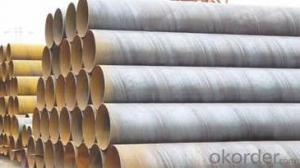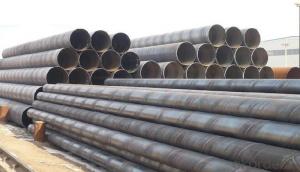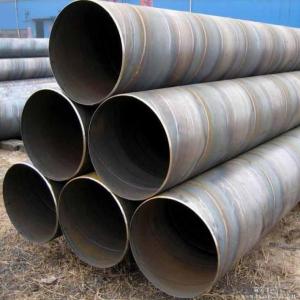SPIRAL STEEL PIPE 38’‘ ASTM API LARGE DIAMETER PIPE
- Loading Port:
- Tianjin
- Payment Terms:
- TT OR LC
- Min Order Qty:
- 5 m.t.
- Supply Capability:
- 3000 m.t./month
OKorder Service Pledge
OKorder Financial Service
You Might Also Like
Packaging & Delivery
Packaging Detail: | standard export packing or as customer's requirement |
Delivery Detail: | within 10 - 30 days |
Specifications
Spiral Welded Steel Pipes and Tubes
1.Material:Q195-Q235
2.Length:1-12m
3.WT:1.0-14mm
4.O.D.:20-273mm
Spiral Welded Steel Pipes and Tubes
Product Description:
1.Material : Q235,Q345,L245,L290,L360,L415,L450,L485,GrB,X42,46,X52,X56,X60,X65,X70,X80,X100
2,Standard: SY/T5037-2000,GB/T9711-2011,API Spec 5L PSL1/PSL2,ASTM A252\A53,ISO3183,DIN17172,EN10217,JIS G3457,AWWA C200,ASTM A139,ASTM A671,ASTM A672
3.Wall thickness: 3.0mm-30mm
4.Outer diameter: φ168mm-3020mm
5,Length: 5m-12m or as your requirement
6,Corrosion protection standard: DIN30670,DIN30671, AWWAC210, AWWA C203, SY/T0413-2002,SY/T0414-2002
7,Application: Oil, gas, natural gas, water pipe, thermal electricity pipe, steel structure engineering, etc
Q195-q345 Material Steel Pipe's Materials
Elements | Chemical Compsition% | Mechanical Property | ||||||
C% | Mn% | S% | P% | Si% | Yield Point (Mpa) | Tensile Strength(Mpa) | Elongation | |
Q195 | 0.06-0.12 | 0.25-0.50 | <0.050< span=""> | <0.045< span=""> | <0.030< span=""> | >195 | 315-430 | 32-33 |
Q215 | 0.09-0.15 | 0.25-0.55 | <0.05< span=""> | <0.045< span=""> | <0.030< span=""> | >215 | 335-450 | 26-31 |
Q235 | 0.12-0.20 | 0.30-0.70 | <0.045< span=""> | <0.045< span=""> | <0.030< span=""> | >235 | 375-500 | 24-26 |
Q345 | <0.20< span=""> | 1.0-1.6 | <0.040< span=""> | <0.040< span=""> | <0.55< span=""> | >345 | 470-630 | 21-22 |
- Q:How are steel pipes used in the construction of sewer systems?
- Steel pipes are commonly used in the construction of sewer systems due to their durability and strength. These pipes are used to transport sewage and wastewater from households and businesses to treatment plants or disposal sites. They are resistant to corrosion and can withstand high pressure, making them ideal for underground installations. Additionally, steel pipes can be manufactured in various sizes and lengths, allowing for efficient and cost-effective installation in sewer infrastructure.
- Q:How do you determine the wall thickness of a steel pipe?
- There are several methods available for determining the wall thickness of a steel pipe. The most commonly used and precise approach involves utilizing a caliper or micrometer to measure it. Initially, ensure that the pipe is thoroughly cleaned and devoid of any debris or rust. Subsequently, gently position the caliper or micrometer around the circumference of the pipe, making certain that it is perpendicular to the surface. Proceed to cautiously close the jaws of the measuring tool until they snugly fit against the pipe, taking care not to excessively tighten them and distort the shape. Once the jaws are closed, observe and take note of the measurement displayed on the tool. This reading corresponds to the distance between the inner and outer diameter of the pipe, which is equivalent to the wall thickness. Alternatively, if a caliper or micrometer is unavailable, a pipe wall thickness gauge can be utilized. These gauges are equipped with a series of pins or rollers that can be inserted into the pipe, providing an accurate measurement. Simply insert the pins into the pipe, ensuring proper alignment with the wall, and refer to the reading displayed on the gauge. It is crucial to note that when measuring the wall thickness of a steel pipe, multiple readings should be taken at various points along the pipe to account for any variations. This will yield a more precise average measurement.
- Q:Can steel pipes be used for underground gas distribution?
- Yes, steel pipes can be used for underground gas distribution. Steel pipes are commonly utilized in the gas industry due to their high strength, durability, and resistance to corrosion. They are capable of withstanding the pressure and stress associated with gas distribution systems. Additionally, steel pipes have been proven to be reliable and safe for transporting natural gas underground. However, it is essential to ensure that the steel pipes are properly coated and protected against corrosion to maintain their integrity and longevity. Regular inspections and maintenance are also necessary to identify and address any potential issues that may arise.
- Q:Can steel pipes be used for chemical processing plants?
- Yes, steel pipes can be used for chemical processing plants. Steel pipes are commonly used in chemical processing plants due to their high strength, durability, and resistance to corrosion. They can effectively handle the high temperatures, pressures, and corrosive chemicals involved in various chemical processes. Additionally, steel pipes can be easily welded and connected, making them suitable for complex piping systems within chemical plants.
- Q:How are steel pipes tested for mechanical strength?
- Steel pipes are typically tested for mechanical strength through various destructive and non-destructive testing methods. Destructive tests involve subjecting the pipes to tension, compression, or bending forces until failure occurs, allowing the measurement of their ultimate tensile strength, yield strength, and elongation. Non-destructive tests, such as ultrasonic testing, magnetic particle inspection, or radiographic examination, are also conducted to detect any internal or surface defects that may affect the mechanical strength of the pipes. These tests ensure that steel pipes meet the required standards and specifications in terms of their mechanical strength.
- Q:Can steel pipes be used for oil well casing?
- Yes, steel pipes can be used for oil well casing. Steel is a commonly used material for oil well casing due to its strength, durability, and resistance to corrosion.
- Q:Can steel pipes be used for underground steam pipelines?
- Yes, steel pipes can be used for underground steam pipelines. Steel pipes are known for their durability and high temperature resistance, making them suitable for transporting steam underground.
- Q:What is the difference between seamless and welded steel pipes?
- The main difference between seamless and welded steel pipes lies in their manufacturing process. Seamless steel pipes are made by piercing a solid billet to form a hollow tube, while welded steel pipes are formed by rolling a flat sheet of steel into a tube and then welding the seam. This difference in manufacturing leads to varying characteristics such as strength, appearance, and cost. Seamless pipes are generally considered to have higher strength and are more aesthetically pleasing, but they are also more expensive to produce. Welded pipes, on the other hand, are more cost-effective and suitable for less demanding applications.
- Q:How are steel pipes protected from corrosion in corrosive environments?
- Steel pipes are protected from corrosion in corrosive environments through various methods such as applying protective coatings, using cathodic protection, and employing corrosion inhibitors.
- Q:What are the different sizes of threads available for steel pipes?
- The different sizes of threads available for steel pipes include standard pipe threads such as NPT (National Pipe Taper) and NPS (National Pipe Straight), as well as metric pipe threads like MPT (Metric Pipe Taper) and MPS (Metric Pipe Straight). These sizes can vary from 1/8 inch all the way up to several inches in diameter, depending on the specific application and industry requirements.
1. Manufacturer Overview |
|
|---|---|
| Location | |
| Year Established | |
| Annual Output Value | |
| Main Markets | |
| Company Certifications | |
2. Manufacturer Certificates |
|
|---|---|
| a) Certification Name | |
| Range | |
| Reference | |
| Validity Period | |
3. Manufacturer Capability |
|
|---|---|
| a)Trade Capacity | |
| Nearest Port | |
| Export Percentage | |
| No.of Employees in Trade Department | |
| Language Spoken: | |
| b)Factory Information | |
| Factory Size: | |
| No. of Production Lines | |
| Contract Manufacturing | |
| Product Price Range | |
Send your message to us
SPIRAL STEEL PIPE 38’‘ ASTM API LARGE DIAMETER PIPE
- Loading Port:
- Tianjin
- Payment Terms:
- TT OR LC
- Min Order Qty:
- 5 m.t.
- Supply Capability:
- 3000 m.t./month
OKorder Service Pledge
OKorder Financial Service
Similar products
New products
Hot products
Related keywords































